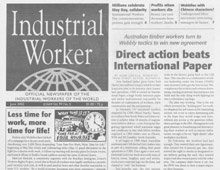London Wobblies Celebrate and Plan
Submitted on Thu, 12/15/2005 - 10:54pm
By Dan Jakopovich, London - Industrial Worker, December 2005
 The recently established London IWW group, which seems to have given a new lease of life to Wobblies in the British Isles, held an IWW centenary celebration at the RampART squatted social centre in East London on 5 November. It was our first public event where the core group, which was established a few months ago, had a general presentation of its ideals, goals and methods.
The recently established London IWW group, which seems to have given a new lease of life to Wobblies in the British Isles, held an IWW centenary celebration at the RampART squatted social centre in East London on 5 November. It was our first public event where the core group, which was established a few months ago, had a general presentation of its ideals, goals and methods.
The high point of the evening was a discussion on building autonomous workers' resistance in London. This was largely centred around trying to draw on previous experiences, such as the Gate Gourmet dispute (See for instance my article "Gate Gourmet: 'not over yet,'" Freedom, 15 October), that have confirmed the importance of militant rank-and-file unionism as the only promising means for annulling the present laws against solidarity strikes. The grassroots democratic model of the Workmates Collective of West London tube workers was also mentioned.
Partly drawing on the perspective of minority/solidarity unionism, the Paris Solidarity Collectives and the flying squads/pickets are particularly refreshing, even if far from being a historically new tactic. Jeff Shantz describes "Flying squads [as] rapid response networks of workers that can be mobilized for strike support, demonstrations, direct action and working class defense of immigrants, poor people, and unemployed workers ... [which] may consist of little more than phone lists and meetings." The emphasis is on "the emergence and growth of autonomous rank-and-file networks." ("Developing Workers Autonomy," http://nefac.net/en/node/915)
Alex Levant notes that flying squads have engaged in activities including "supporting striking workers, as well as unorganized, unemployed, and unpaid workers, stopping deportations, challenging abusive landlords, and mobilizing for mass protests against capitalist globalization. ... By developing abilities that normally atrophy under capitalism, flying squads help overcome the crisis of working-class self-organization."("Flying Squads and the Crisis of Workers' Self-Organisation," New Socialist, Spring 2003)
In addition to these benefits, flying squads/pickets could also contribute, among other things, to the creation of an authentic "community of resistance" - greater cooperation, coordination and general interaction within "the broader movement," linking groups and struggles which have previously been isolated and disconnected, or at least failed to live up to their true potential. However, there is also a danger of stagnating and inward-turning flying squads slipping into "activist" roles, followed by progressive disassociation from the workers themselves.
Serious and consistent strategising is needed, which should also involve a greater openness to the labour-community model of organising. The unfolding "regeneration" (gentrification) of East London (further legitimised and also accelerated by the 2012 London Olympics) and the probability of a council tax increase, property values and rents skyrocketing (effectively driving working-class people to the outskirts of the city - a phenomenon which has already happened to many Cockneys during the "regeneration" of the Docklands during the 60s, 70s & 80s) - coupled with tens of thousands expected new, mostly Eastern European (hyper-exploited) building workers, relatively militant transport workers and the great bargaining power of the many service industries closely tied to the Olympics - constitutes a potentially explosive mix which could offset a general upsurge in working-class combativity.
One of the prominent issues which were raised in the discussion (particularly by disenchanted, yet active members of the business unions) revolved around the benefits of dual membership (which the IWW allows) and the need for a core group of the most militant workers who could more easily develop rank-and-file factions and networks in and across their unions, simultaneously helping to provide the IWW with a larger pool of experience, resources and access to rank-and-file union members (and in turn increasing the chances for building stronger and new workplace resistance groups).
Obviously, there are many other considerations and possibilities, many of which are more typical of the general IWW approach it is famous for. One thing is certain - there is no adequate substitute for challenging the labour dry spell, and it is high time for the British libertarian left to finally start embracing workers' struggles, agitation and organising again. I believe the IWW could have an important role to play in these efforts.